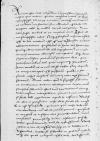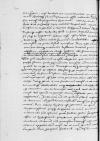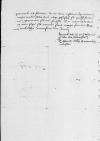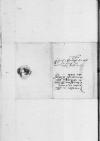 UUB, H. 154, f. 30r
UUB, H. 154, f. 30r
Rumor hic erat aliquandiu, carissime Dantisce, nescio quo auctore quave occasione natus, te vivis excessisse. Quem rumorem neutiquam mendacem esse, ut crederem, eo facilius sum adductus, q(uod) tanto iam tempore ab te nullam literam acceperim. Nam totis hisce tribus et eo amplius annis, quod sciam, ad me scripsisti nihil. Itaque persuaseram mihi verisimilius esse te omnino mortuum esse quam vel desidiosum vel mei oblitum vivere, qui solebas esse homo omnium hominum, quos equidem noverim, ad omnia impigerrimus, et erga amicos minime obliviosus aut ingratus. Atque idcirco supervacuum fore putabam si scriberem ad te, quin potius manibus tuis pacem requiemque precatus, Deum orabam, ut in eius caelesti regno socii aliquando et comparticipes esse possimus, quando in hoc seculo nihil amplius commercii inter nos futurum sperarem. Nunc autem, cum te superesse salvum et incolumem dudum intellexerim, volui meis scriptis silentium istud tuum tam diuturnum tamque veternosum interpellare, simul et mei memoriam, si forte tibi exciderim, apud te refricare. Subest et alia in praesentia mihi ad te scribendi causa. Ea est istiusmodi. Georgius Rogenellus Lithuanian, at least from 1534 scholar of Trinity Hall in Cambridge; ca. 1530 entered the service of Thomas Cranmer on Dantiscus' recommendation and came back to Poland after ca. 10 years (GAIRDNER 1883, p. 80)⌊PuerGeorgius Rogenellus Lithuanian, at least from 1534 scholar of Trinity Hall in Cambridge; ca. 1530 entered the service of Thomas Cranmer on Dantiscus' recommendation and came back to Poland after ca. 10 years (GAIRDNER 1883, p. 80)⌋, quem mihi dederas educandum, iam ad id aetatis pervenit, quo sicuti a magnis et in sapentia precellentibus viris consultum praeceptumque video, constituere quisque debet, quam vivendi viam sit ingressurus. Vocatus igitur a me et iussus uti super ea re deliberaret, respondit, velle se libenter in patriam regredi atque ibi, quod reliquum esset vitae, Deo disponente
 UUB, H. 154, f. 30v
transigere, nisi dubitaret, an tu viveres. In quo rerum speumque suarum summa esset collocata dumque hic tamquam ad scopulum haeremus, ecce veluti θεός ἀπὸ μηχανῆς vir nobilis Sigismund I Jagiellon (Zygmunt I) (*1467 – †1548), King of Poland and Grand Duke of Lithuania (1506-1548); Duke of Głogów (Glogau) (1499-1506), Duke of Opava (1501-1506), Governor of Silesia (1504-1506); son of King Kazimierz IV Jagiellon and Elisabeth of Austria⌊regisSigismund I Jagiellon (Zygmunt I) (*1467 – †1548), King of Poland and Grand Duke of Lithuania (1506-1548); Duke of Głogów (Glogau) (1499-1506), Duke of Opava (1501-1506), Governor of Silesia (1504-1506); son of King Kazimierz IV Jagiellon and Elisabeth of Austria⌋ vestri apud Charles V of Habsburg (*1500 – †1558), ruler of the Burgundian territories (1506-1555), King of Spain as Charles I (1516-1556), King of Naples and Sicily, King of the Romans (1519-1530), Holy Roman Emperor of the German Nation (elected 1519, crowned 1530, abdicated 1556); son of Philip I the Handsome and Joanna the Mad of Castile⌊caesaremCharles V of Habsburg (*1500 – †1558), ruler of the Burgundian territories (1506-1555), King of Spain as Charles I (1516-1556), King of Naples and Sicily, King of the Romans (1519-1530), Holy Roman Emperor of the German Nation (elected 1519, crowned 1530, abdicated 1556); son of Philip I the Handsome and Joanna the Mad of Castile⌋ legatus e vicino The Belgians ⌊BelgarumThe Belgians ⌋ litore, Henry VIII Tudor (*1491 – †1547), 1509-1547 King of England; son of Henry VII Tudor and Elizabeth of York⌊regisHenry VIII Tudor (*1491 – †1547), 1509-1547 King of England; son of Henry VII Tudor and Elizabeth of York⌋ England⌊regniEngland⌋que nostri videndi gratia in hanc insulam traicit. Is super te rogatus, laetum responsum dedit te vivere valereque. Quo nuntio Georgius Rogenellus Lithuanian, at least from 1534 scholar of Trinity Hall in Cambridge; ca. 1530 entered the service of Thomas Cranmer on Dantiscus' recommendation and came back to Poland after ca. 10 years (GAIRDNER 1883, p. 80)⌊iuvenisGeorgius Rogenellus Lithuanian, at least from 1534 scholar of Trinity Hall in Cambridge; ca. 1530 entered the service of Thomas Cranmer on Dantiscus' recommendation and came back to Poland after ca. 10 years (GAIRDNER 1883, p. 80)⌋ incredibiliter est accensus, ut Poland (Kingdom of Poland, Polonia)⌊patriam suamPoland (Kingdom of Poland, Polonia)⌋ reviseret. Nec ego Georgius Rogenellus Lithuanian, at least from 1534 scholar of Trinity Hall in Cambridge; ca. 1530 entered the service of Thomas Cranmer on Dantiscus' recommendation and came back to Poland after ca. 10 years (GAIRDNER 1883, p. 80)⌊eiusGeorgius Rogenellus Lithuanian, at least from 1534 scholar of Trinity Hall in Cambridge; ca. 1530 entered the service of Thomas Cranmer on Dantiscus' recommendation and came back to Poland after ca. 10 years (GAIRDNER 1883, p. 80)⌋ tam pio tamque naturali desiderio diutius quivi obsistere. Legatum itaque rogavi, uti Georgius Rogenellus Lithuanian, at least from 1534 scholar of Trinity Hall in Cambridge; ca. 1530 entered the service of Thomas Cranmer on Dantiscus' recommendation and came back to Poland after ca. 10 years (GAIRDNER 1883, p. 80)⌊iuveneGeorgius Rogenellus Lithuanian, at least from 1534 scholar of Trinity Hall in Cambridge; ca. 1530 entered the service of Thomas Cranmer on Dantiscus' recommendation and came back to Poland after ca. 10 years (GAIRDNER 1883, p. 80)⌋m in comitatum suum admiterret <eiusque transmittendi curam in se susciperet> accepto a me viatico. Sed cum ille varias causas allegaret, quo minus id possit facere, quod proximum erat, transegi cum mercatore quodam de eo per Baltic Sea⌊mareBaltic Sea⌋ Gdańsk (Danzig, Dantiscum), city in northern Poland, on the Bay of Gdańsk at the mouth of the Vistula, on the Baltic, the biggest and wealthiest of the three Great Prussian Cities (Gdańsk, Thorn (Toruń), and Elbing (Elbląg)) with representation in the Council of Royal Prussia; a member of the Hanseatic League⌊DantiscumGdańsk (Danzig, Dantiscum), city in northern Poland, on the Bay of Gdańsk at the mouth of the Vistula, on the Baltic, the biggest and wealthiest of the three Great Prussian Cities (Gdańsk, Thorn (Toruń), and Elbing (Elbląg)) with representation in the Council of Royal Prussia; a member of the Hanseatic League⌋ usque transportando. Quod superest, te obsecro obtestorque per nostram intemeratam amicitiam, ut Georgius Rogenellus Lithuanian, at least from 1534 scholar of Trinity Hall in Cambridge; ca. 1530 entered the service of Thomas Cranmer on Dantiscus' recommendation and came back to Poland after ca. 10 years (GAIRDNER 1883, p. 80)⌊iuvenemGeorgius Rogenellus Lithuanian, at least from 1534 scholar of Trinity Hall in Cambridge; ca. 1530 entered the service of Thomas Cranmer on Dantiscus' recommendation and came back to Poland after ca. 10 years (GAIRDNER 1883, p. 80)⌋ istum animo non minus benevolo nunc a <me> recipias, quam ego eum puerum olim ab te accepi. Utque sicuti a me hactenus causa et amore tui, neutiquam illiberaliter neque indiligenter est educatus. Ita tu deinceps vel Georgius Rogenellus Lithuanian, at least from 1534 scholar of Trinity Hall in Cambridge; ca. 1530 entered the service of Thomas Cranmer on Dantiscus' recommendation and came back to Poland after ca. 10 years (GAIRDNER 1883, p. 80)⌊eiusGeorgius Rogenellus Lithuanian, at least from 1534 scholar of Trinity Hall in Cambridge; ca. 1530 entered the service of Thomas Cranmer on Dantiscus' recommendation and came back to Poland after ca. 10 years (GAIRDNER 1883, p. 80)⌋ vel etiam mea causa des operam, ut honesto alicui <vitae> instituto per te applicetur. Invenies Georgius Rogenellus Lithuanian, at least from 1534 scholar of Trinity Hall in Cambridge; ca. 1530 entered the service of Thomas Cranmer on Dantiscus' recommendation and came back to Poland after ca. 10 years (GAIRDNER 1883, p. 80)⌊eumGeorgius Rogenellus Lithuanian, at least from 1534 scholar of Trinity Hall in Cambridge; ca. 1530 entered the service of Thomas Cranmer on Dantiscus' recommendation and came back to Poland after ca. 10 years (GAIRDNER 1883, p. 80)⌋ ad quidvis satis aptum et idoneum, linguam tenet nostratem tanquam hic fuisset natus. Nec Latinae linguae est ignarus, in qua elegantissimos quosque auctores et iuris civilis rudimenta sub optimis, quos habere potui, preceptoribus effeci, ut degustaret. Praeterea, quo absolutior evaderet, Paris (Lutetia Parisiorum, Parisii), city in central France, on the Seine river, capital of France⌊Lutetiam eum ParisiorumParis (Lutetia Parisiorum, Parisii), city in central France, on the Seine river, capital of France⌋ tamquam Athens (Athenae), city-state in ancient Greece⌊AthenasAthens (Athenae), city-state in ancient Greece⌋ alteras expoliendum misi, ut et eius gentis mores, linguam, litteras perceptas haberet. Postremo
UUB, H. 154, f. 30v
transigere, nisi dubitaret, an tu viveres. In quo rerum speumque suarum summa esset collocata dumque hic tamquam ad scopulum haeremus, ecce veluti θεός ἀπὸ μηχανῆς vir nobilis Sigismund I Jagiellon (Zygmunt I) (*1467 – †1548), King of Poland and Grand Duke of Lithuania (1506-1548); Duke of Głogów (Glogau) (1499-1506), Duke of Opava (1501-1506), Governor of Silesia (1504-1506); son of King Kazimierz IV Jagiellon and Elisabeth of Austria⌊regisSigismund I Jagiellon (Zygmunt I) (*1467 – †1548), King of Poland and Grand Duke of Lithuania (1506-1548); Duke of Głogów (Glogau) (1499-1506), Duke of Opava (1501-1506), Governor of Silesia (1504-1506); son of King Kazimierz IV Jagiellon and Elisabeth of Austria⌋ vestri apud Charles V of Habsburg (*1500 – †1558), ruler of the Burgundian territories (1506-1555), King of Spain as Charles I (1516-1556), King of Naples and Sicily, King of the Romans (1519-1530), Holy Roman Emperor of the German Nation (elected 1519, crowned 1530, abdicated 1556); son of Philip I the Handsome and Joanna the Mad of Castile⌊caesaremCharles V of Habsburg (*1500 – †1558), ruler of the Burgundian territories (1506-1555), King of Spain as Charles I (1516-1556), King of Naples and Sicily, King of the Romans (1519-1530), Holy Roman Emperor of the German Nation (elected 1519, crowned 1530, abdicated 1556); son of Philip I the Handsome and Joanna the Mad of Castile⌋ legatus e vicino The Belgians ⌊BelgarumThe Belgians ⌋ litore, Henry VIII Tudor (*1491 – †1547), 1509-1547 King of England; son of Henry VII Tudor and Elizabeth of York⌊regisHenry VIII Tudor (*1491 – †1547), 1509-1547 King of England; son of Henry VII Tudor and Elizabeth of York⌋ England⌊regniEngland⌋que nostri videndi gratia in hanc insulam traicit. Is super te rogatus, laetum responsum dedit te vivere valereque. Quo nuntio Georgius Rogenellus Lithuanian, at least from 1534 scholar of Trinity Hall in Cambridge; ca. 1530 entered the service of Thomas Cranmer on Dantiscus' recommendation and came back to Poland after ca. 10 years (GAIRDNER 1883, p. 80)⌊iuvenisGeorgius Rogenellus Lithuanian, at least from 1534 scholar of Trinity Hall in Cambridge; ca. 1530 entered the service of Thomas Cranmer on Dantiscus' recommendation and came back to Poland after ca. 10 years (GAIRDNER 1883, p. 80)⌋ incredibiliter est accensus, ut Poland (Kingdom of Poland, Polonia)⌊patriam suamPoland (Kingdom of Poland, Polonia)⌋ reviseret. Nec ego Georgius Rogenellus Lithuanian, at least from 1534 scholar of Trinity Hall in Cambridge; ca. 1530 entered the service of Thomas Cranmer on Dantiscus' recommendation and came back to Poland after ca. 10 years (GAIRDNER 1883, p. 80)⌊eiusGeorgius Rogenellus Lithuanian, at least from 1534 scholar of Trinity Hall in Cambridge; ca. 1530 entered the service of Thomas Cranmer on Dantiscus' recommendation and came back to Poland after ca. 10 years (GAIRDNER 1883, p. 80)⌋ tam pio tamque naturali desiderio diutius quivi obsistere. Legatum itaque rogavi, uti Georgius Rogenellus Lithuanian, at least from 1534 scholar of Trinity Hall in Cambridge; ca. 1530 entered the service of Thomas Cranmer on Dantiscus' recommendation and came back to Poland after ca. 10 years (GAIRDNER 1883, p. 80)⌊iuveneGeorgius Rogenellus Lithuanian, at least from 1534 scholar of Trinity Hall in Cambridge; ca. 1530 entered the service of Thomas Cranmer on Dantiscus' recommendation and came back to Poland after ca. 10 years (GAIRDNER 1883, p. 80)⌋m in comitatum suum admiterret <eiusque transmittendi curam in se susciperet> accepto a me viatico. Sed cum ille varias causas allegaret, quo minus id possit facere, quod proximum erat, transegi cum mercatore quodam de eo per Baltic Sea⌊mareBaltic Sea⌋ Gdańsk (Danzig, Dantiscum), city in northern Poland, on the Bay of Gdańsk at the mouth of the Vistula, on the Baltic, the biggest and wealthiest of the three Great Prussian Cities (Gdańsk, Thorn (Toruń), and Elbing (Elbląg)) with representation in the Council of Royal Prussia; a member of the Hanseatic League⌊DantiscumGdańsk (Danzig, Dantiscum), city in northern Poland, on the Bay of Gdańsk at the mouth of the Vistula, on the Baltic, the biggest and wealthiest of the three Great Prussian Cities (Gdańsk, Thorn (Toruń), and Elbing (Elbląg)) with representation in the Council of Royal Prussia; a member of the Hanseatic League⌋ usque transportando. Quod superest, te obsecro obtestorque per nostram intemeratam amicitiam, ut Georgius Rogenellus Lithuanian, at least from 1534 scholar of Trinity Hall in Cambridge; ca. 1530 entered the service of Thomas Cranmer on Dantiscus' recommendation and came back to Poland after ca. 10 years (GAIRDNER 1883, p. 80)⌊iuvenemGeorgius Rogenellus Lithuanian, at least from 1534 scholar of Trinity Hall in Cambridge; ca. 1530 entered the service of Thomas Cranmer on Dantiscus' recommendation and came back to Poland after ca. 10 years (GAIRDNER 1883, p. 80)⌋ istum animo non minus benevolo nunc a <me> recipias, quam ego eum puerum olim ab te accepi. Utque sicuti a me hactenus causa et amore tui, neutiquam illiberaliter neque indiligenter est educatus. Ita tu deinceps vel Georgius Rogenellus Lithuanian, at least from 1534 scholar of Trinity Hall in Cambridge; ca. 1530 entered the service of Thomas Cranmer on Dantiscus' recommendation and came back to Poland after ca. 10 years (GAIRDNER 1883, p. 80)⌊eiusGeorgius Rogenellus Lithuanian, at least from 1534 scholar of Trinity Hall in Cambridge; ca. 1530 entered the service of Thomas Cranmer on Dantiscus' recommendation and came back to Poland after ca. 10 years (GAIRDNER 1883, p. 80)⌋ vel etiam mea causa des operam, ut honesto alicui <vitae> instituto per te applicetur. Invenies Georgius Rogenellus Lithuanian, at least from 1534 scholar of Trinity Hall in Cambridge; ca. 1530 entered the service of Thomas Cranmer on Dantiscus' recommendation and came back to Poland after ca. 10 years (GAIRDNER 1883, p. 80)⌊eumGeorgius Rogenellus Lithuanian, at least from 1534 scholar of Trinity Hall in Cambridge; ca. 1530 entered the service of Thomas Cranmer on Dantiscus' recommendation and came back to Poland after ca. 10 years (GAIRDNER 1883, p. 80)⌋ ad quidvis satis aptum et idoneum, linguam tenet nostratem tanquam hic fuisset natus. Nec Latinae linguae est ignarus, in qua elegantissimos quosque auctores et iuris civilis rudimenta sub optimis, quos habere potui, preceptoribus effeci, ut degustaret. Praeterea, quo absolutior evaderet, Paris (Lutetia Parisiorum, Parisii), city in central France, on the Seine river, capital of France⌊Lutetiam eum ParisiorumParis (Lutetia Parisiorum, Parisii), city in central France, on the Seine river, capital of France⌋ tamquam Athens (Athenae), city-state in ancient Greece⌊AthenasAthens (Athenae), city-state in ancient Greece⌋ alteras expoliendum misi, ut et eius gentis mores, linguam, litteras perceptas haberet. Postremo
 UUB, H. 154, f. 31r
paucis ut finiam, de Georgius Rogenellus Lithuanian, at least from 1534 scholar of Trinity Hall in Cambridge; ca. 1530 entered the service of Thomas Cranmer on Dantiscus' recommendation and came back to Poland after ca. 10 years (GAIRDNER 1883, p. 80)⌊eoGeorgius Rogenellus Lithuanian, at least from 1534 scholar of Trinity Hall in Cambridge; ca. 1530 entered the service of Thomas Cranmer on Dantiscus' recommendation and came back to Poland after ca. 10 years (GAIRDNER 1883, p. 80)⌋ bene instituendo non minus, mehercule solicitus atque profusus fui, quam si fratris mei germani filius fuisset. Tu cura, ut valeas et mei saepe sis memor, sicut et ego sum tui.
UUB, H. 154, f. 31r
paucis ut finiam, de Georgius Rogenellus Lithuanian, at least from 1534 scholar of Trinity Hall in Cambridge; ca. 1530 entered the service of Thomas Cranmer on Dantiscus' recommendation and came back to Poland after ca. 10 years (GAIRDNER 1883, p. 80)⌊eoGeorgius Rogenellus Lithuanian, at least from 1534 scholar of Trinity Hall in Cambridge; ca. 1530 entered the service of Thomas Cranmer on Dantiscus' recommendation and came back to Poland after ca. 10 years (GAIRDNER 1883, p. 80)⌋ bene instituendo non minus, mehercule solicitus atque profusus fui, quam si fratris mei germani filius fuisset. Tu cura, ut valeas et mei saepe sis memor, sicut et ego sum tui.
 UUB, H. 154, f. 30v
transigere, nisi dubitaret, an tu viveres. In quo rerum speumque suarum summa esset collocata dumque hic tamquam ad scopulum haeremus, ecce veluti θεός ἀπὸ μηχανῆς vir nobilis
UUB, H. 154, f. 30v
transigere, nisi dubitaret, an tu viveres. In quo rerum speumque suarum summa esset collocata dumque hic tamquam ad scopulum haeremus, ecce veluti θεός ἀπὸ μηχανῆς vir nobilis  UUB, H. 154, f. 31r
paucis ut finiam, de
UUB, H. 154, f. 31r
paucis ut finiam, de 


